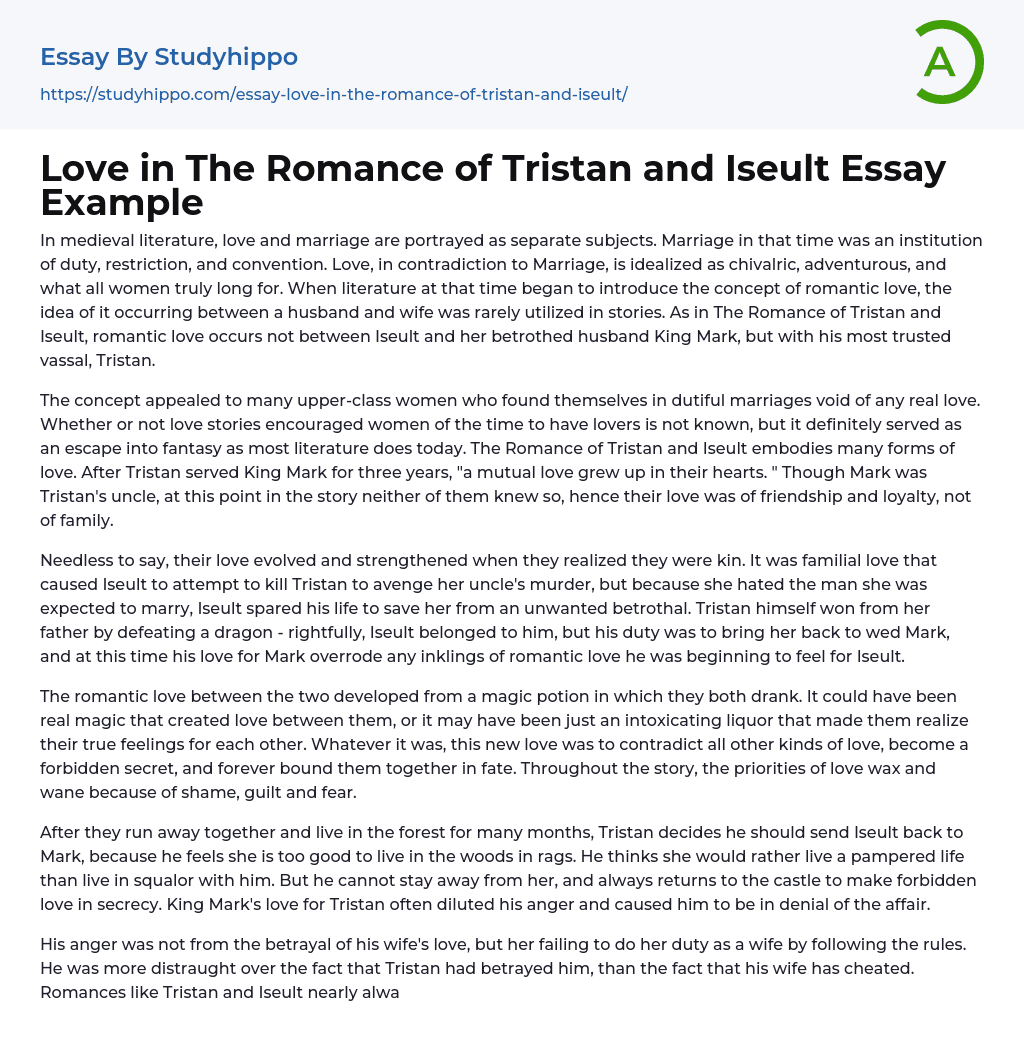In medieval literature, love and marriage are portrayed as separate subjects. Marriage in that time was an institution of duty, restriction, and convention. Love, in contradiction to Marriage, is idealized as chivalric, adventurous, and what all women truly long for. When literature at that time began to introduce the concept of romantic love, the idea of it occurring between a husband and wife was rarely utilized in stories. As in The Romance of Tristan and Iseult, romantic love occurs not between Iseult and her betrothed husband King Mark, but with his most trusted vassal, Tristan.
The concept appealed to many upper-class women who found themselves in dutiful marriages void of any real love. Whether or not love stories encouraged women of the time to have lovers is not known, but it definitel
...y served as an escape into fantasy as most literature does today. The Romance of Tristan and Iseult embodies many forms of love. After Tristan served King Mark for three years, "a mutual love grew up in their hearts. " Though Mark was Tristan's uncle, at this point in the story neither of them knew so, hence their love was of friendship and loyalty, not of family.
Needless to say, their love evolved and strengthened when they realized they were kin. It was familial love that caused Iseult to attempt to kill Tristan to avenge her uncle's murder, but because she hated the man she was expected to marry, Iseult spared his life to save her from an unwanted betrothal. Tristan himself won from her father by defeating a dragon - rightfully, Iseult belonged to him, but his duty was to bring her back to wed
Mark, and at this time his love for Mark overrode any inklings of romantic love he was beginning to feel for Iseult.
The romantic love between the two developed from a magic potion in which they both drank. It could have been real magic that created love between them, or it may have been just an intoxicating liquor that made them realize their true feelings for each other. Whatever it was, this new love was to contradict all other kinds of love, become a forbidden secret, and forever bound them together in fate. Throughout the story, the priorities of love wax and wane because of shame, guilt and fear.
After they run away together and live in the forest for many months, Tristan decides he should send Iseult back to Mark, because he feels she is too good to live in the woods in rags. He thinks she would rather live a pampered life than live in squalor with him. But he cannot stay away from her, and always returns to the castle to make forbidden love in secrecy. King Mark's love for Tristan often diluted his anger and caused him to be in denial of the affair.
His anger was not from the betrayal of his wife's love, but her failing to do her duty as a wife by following the rules. He was more distraught over the fact that Tristan had betrayed him, than the fact that his wife has cheated. Romances like Tristan and Iseult nearly always ended in tragedy. The concept of romantic love was popular in fiction and was idealized as the ultimate satisfaction of the self, but these stories make death the
eventual outcome of such love.
This tells us that at the time of these stories, duty to your family and lord still took the highest precedence. Fulfilling your duty as a wife or a vassal would get you a satisfying physical life, you would be taken care of, respected and die honourably. Carrying out individual desires in hopes of emotional fulfillment would bring about misery, shame and unhonourable death. Romance stories gave people a fantasy to live out in their minds, while at the same time giving an explicit warning that such fantasy was never to become reality.
- Adoption essays
- Aunt essays
- Babies essays
- Bedroom essays
- Caring essays
- Children essays
- Daughter essays
- Divorce essays
- Dog essays
- Dysfunctional Family essays
- Family Tradition essays
- Family Values essays
- Father essays
- Foster Care essays
- Friends essays
- Grandparent essays
- Home essays
- Hometown essays
- Husband essays
- Jealousy essays
- Love essays
- Marriage essays
- Mother essays
- Online Dating essays
- Parenting essays
- Parenting Teens essays
- Parents essays
- Relationship essays
- Room essays
- Sibling essays
- Sister essays
- Wedding essays
- Wife essays
- Ambition essays
- Anger essays
- Betrayal essays
- Boredom essays
- Confidence essays
- Courage essays
- Desire essays
- Disgrace essays
- Doubt essays
- Empathy essays
- Fairness essays
- Fear essays
- Feeling essays
- Forgiveness essays
- Grief essays
- Guilt essays
- Happiness essays




